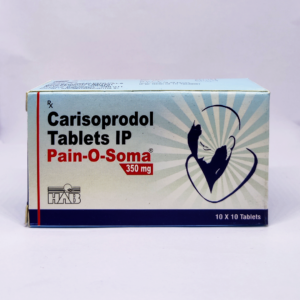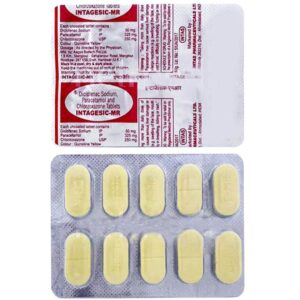PHENERGAN 25 mg
PHENERGAN 25 mg is an antihistamine, which is a type of drug used to treat allergic reactions, sleeplessness, and travel sickness. Allergy, also known as hypersensitivity, is an immune system reaction to foreign substances that are usually harmless to your body. Insomnia is a sleep condition in which you have trouble sleeping or staying asleep. Travel sickness is a nausea and vomiting-based condition caused by motion during travel.
The antihistamine ‘promethazine’ is included in PHENERGAN 25 mg. It decreases allergy symptoms by blocking the activity of histamines (chemicals that cause allergic symptoms). It also has a direct effect on the brain, resulting in a soothing and anti-nausea effect.
PHENERGAN 25 mg can be taken as a pill, syrup, injection, or suppository. With a glass of water, the tablets are consumed whole. A measuring cup is used to measure the syrup, which is then consumed with water. Only a healthcare professional may administer the injection. Suppositories are solely for rectal use and are provided to individuals who are unable to take the drug in any other manner. Your doctor will determine the dosage and duration of this medication. Dry mouth, blurred vision, drowsiness, dizziness, headache, tiredness, disorientation, nightmares, confusion, restlessness, loss of appetite, indigestion, low blood pressure (hypotension), photosensitivity (redness or rashes on sun-exposed skin), and an uncontrollable urge to move the legs are some of the most common side effects of PHENERGAN 25 mg (Restless Legs Syndrome). If these adverse effects persist or worsen, get medical help right away.
If you are allergic to promethazine or any of its ingredients, do not use PHENERGAN 25 mg. Due to the danger of respiratory depression, PHENERGAN 25 mg should not be administered to children under the age of two (slow and ineffective breathing). PHENERGAN 25 mg may induce photosensitivity in the skin (rashes and redness on sun-exposed skin). As a result, limit your time in the sun. Because PHENERGAN 25 mg might make you dizzy, you should avoid driving or operating heavy machinery while taking it. This drug may induce respiratory depression or excessive sleepiness if you have sleep apnea (a sleeping issue) or chronic obstructive pulmonary disease (COPD) (a lung illness). While using this medication, avoid drinking alcohol. Because PHENERGAN 25 mg tablets contain lactose, tell your doctor if you have a sugar sensitivity.
Allergy, sleeplessness, and travel sickness are some of the conditions that PHENERGAN 25MG TABLET can help with.

Medicinal Advantages
The active ingredient in PHENERGAN 25 mg is ‘promethazine,’ which belongs to the phenothiazines family of drugs. It’s an antihistamine that prevents histamines from working (chemicals causing allergic symptoms). It can help with itching, watery eyes, hives, a runny nose, and sneezing, among other allergy symptoms. It also has a direct impact on the brain, which is soothing and anti-nausea. It is used to cure insomnia for a brief period of time. It can help with symptoms like nausea (nausea) and vomiting (vomiting) caused by travel or motion sickness.
Use Instructions
PHENERGAN 25 mg is available in tablet, elixir, injectable, and suppository dosage forms. Tablet: Swallow the tablet whole with a glass of water. The pills should not be crushed, chewed, or broken. For best effects, take the pills at the same time every day. Syrup: Using a measuring cup or an oral syringe, measure out the appropriate amount of syrup and consume it with a glass of water. Do not use a regular spoon to measure the syrup. Do not self-administer injections; they must be administered by a healthcare professional. Suppositories: Suppositories are only to be used in the rectal area. Hands should be washed before and after each usage. Raise the opposite side knee to your chest while lying on one side. Then, with your finger, put the suppository approximately 12 to 1 inch into the rectum and keep it there for a few seconds. After about 15 minutes of lying down, carefully rise up.
Storage
Store in a cool, dry location away from direct sunlight.
PHENERGAN’S SIDE EFFECTS
Dry mouth, blurred vision, drowsiness, dizziness, headache, tiredness, disorientation, nightmares, confusion, restlessness, loss of appetite (anorexia), indigestion (dyspepsia), low blood pressure (hypotension), photosensitivity (redness or rashes on sun-exposed skin), and an uncontrollable urge to move the legs are some of the possible side effects of PHENERGAN 25 mg (Restless Legs Syndrome). Consult a doctor right away if these adverse effects don’t go away or grow worse.
Precautions and Warnings in Depth
If you are allergic to PHENERGAN 25 mg or any of its ingredients, do not take it. Please inform your doctor if you are taking any antidepressants before taking PHENERGAN 25MG TABLET, as taking them together might induce severe drowsiness. Children under the age of five should not be given this drug, nor should patients who are unconscious or have severe drowsiness, dizziness, or headache. If you have trouble breathing, asthma, or bronchitis (lung difficulties), epilepsy (fits), major heart problems, liver or kidney problems, a stomach obstruction, hearing problems, glaucoma, or Reye’s Syndrome, tell your doctor (swelling in the liver and brain in children). Also, let your doctor know if you’re pregnant or nursing. Dizziness and sleepiness are side effects of this medication. As a result, restrict your alcohol intake and avoid activities that demand you to be cognitively awake. Photosensitivity can be caused by extended exposure to sunlight or the use of sun lights (rashes on sun-exposed skin).
Interactions Between Drugs
Anticholinergic medications, antidepressants, sedatives (diazepam and zolpidem), and pain relievers may interact with PHENERGAN 25 mg (aspirin).
Drug-food interactions: PHENERGAN 25MG TABLET may be affected by alcohol.
Drug-disease interactions: Patients with respiratory diseases (asthma), liver or kidney difficulties, major cardiac problems, sleep disorders, seizures, hearing problems, glaucoma (eye problems), and Reye’s Syndrome should take promethazine with caution (swelling in the liver and brain in children).
Safety Suggestions
ALCOHOL
When used with alcohol, promethazine causes sleepiness. As a result, avoid drinking alcohol while using PHENERGAN 25MG TABLET.
PREGNANCY
Promethazine is classified as a category C drug. It has the potential to harm the fetus. It should only be used in pregnant women if absolutely necessary. Please seek medical advice. Before prescribing it to you, your doctor will consider the advantages as well as any possible hazards.
BREAST FEEDING
Promethazine can be passed through breast milk and cause damage to the infant. As a result, unless your doctor prescribes it, do not use Promethazine in nursing moms.
DRIVING
Drowsiness and dizziness are possible side effects of promethazine. So, if you’re taking PHENERGAN 25MG TABLET, don’t drive or operate heavy machinery.
LIVER
In people with liver problems, promethazine should be taken with care. Before prescribing it to you, your doctor will consider the advantages as well as any possible hazards. Please seek medical advice.
KIDNEY
In people with renal illness, promethazine should be administered with care. Before prescribing it to you, your doctor will consider the advantages as well as any possible hazards. Please seek medical advice.
No habit formation
Advice on Diet and Lifestyle
Allergy :
Stay hydrated, especially if you have a cough or cold. Cough, runny nose, and sneezing can be relieved by drinking liquids at room temperature.
Avoid stress since it affects the immune system and increases the chance of getting sick. To reduce stress, a person can exercise frequently, meditate, practice deep breathing, and use progressive muscle relaxation techniques.
Maintain a healthy lifestyle by exercising regularly and sleeping for 7-9 hours each night.
Pollen, dust, and other recognized allergens (allergy-causing substances) should be avoided. Certain foods are known to trigger allergies in certain people.
Keep your personal hygiene up to date and your surroundings tidy.
Insomnia :
Maintain a regular sleeping pattern. Every day, including weekends, get up at the same hour. Create a relaxing sleeping environment.
Continue to be active.
Avoid taking naps.
Before going to bed, avoid eating heavy meals.
Reduce your alcohol consumption and quit smoking.
Sickness caused by travel :
Before you go, stay away from spicy, oily, and acidic meals. Cereals, apples, bananas, or bread are all good choices.
If necessary, slow down.
Position yourself where there is the least amount of motion, such as in the front of a car, in the middle of a boat or ship, or above the wings of an airplane.
If possible, open the window to get some fresh air.
Avoid consuming alcoholic beverages. 24 hours prior to departure and throughout the journey.
Recommendations
Because promethazine makes your skin sensitive, avoid being in the sun for lengthy periods of time, avoid using sun lamps, use an excellent sunscreen, and wear protective clothes while going out.
Before taking any allergy test, tell your doctor that you’re taking PHENERGAN 25MG TABLET.
Other details: This item is non-refundable.
Glossary of Diseases and Conditions
Allergy (hypersensitivity) is an immune system reaction to external substances that are usually not damaging to your body. ‘Allergens’ are these alien substances. Itching, watery eyes, hives, runny nose, and sneezing are some of the symptoms. The severity of an allergic reaction varies from person to person. Certain foods and seasonal allergens, such as hay fever, may cause allergic reactions in certain people. Others, on the other hand, may be sensitive to pollen or pet dander.
Insomnia is a sleep condition in which it is difficult to fall or remain asleep on a regular basis. Poor sleeping habits, sadness, a lack of physical exercise, or long-term diseases can all contribute to it. Depending on the underlying cause, it can be acute (short-term) or chronic (long-term).
Travel sickness is a disease brought on by movement when traveling. When the motion stops, the ailment typically goes away. Nausea, vomiting, dizziness, and exhaustion are some of the symptoms.
FAQs
Promethazine inhibits the function of histamines, which are the molecules that cause allergic reactions. It has a soothing, calming, and anti-nausea effect because it acts directly on the brain.
Short-term usage of promethazine is typically advised. Unless your doctor advises otherwise, do not take longer than indicated.
Promethazine should not be given to children under the age of five since it might cause respiratory depression (slow and ineffective breathing). Use only if a child expert has recommended it for children above the age of five.
Promethazine can make you drowsy, so don’t drive or drink if you’re taking it. Avoid direct sunlight since it might promote photosensitivity, which can result in rashes on sun-exposed skin.
If it’s been less than 2 hours since your last dosage, you can take it as soon as you recall. If the next dosage is approaching, omit the missed dose and take the following dose as normal at the scheduled time. Do not double your dose or take more than the recommended amount.
If promethazine is used during pregnancy, it may damage the unborn child. As a result, only take Promethazine if your doctor has recommended it.
RLS is a disorder in which you have an uncontrolled impulse to move your legs, generally in response to an unpleasant sensation. It usually happens when you’re seated or lying down in the evening or at night. Moving around briefly alleviates the uncomfortable sensation.








Leave a Reply
You must be logged in to post a comment.